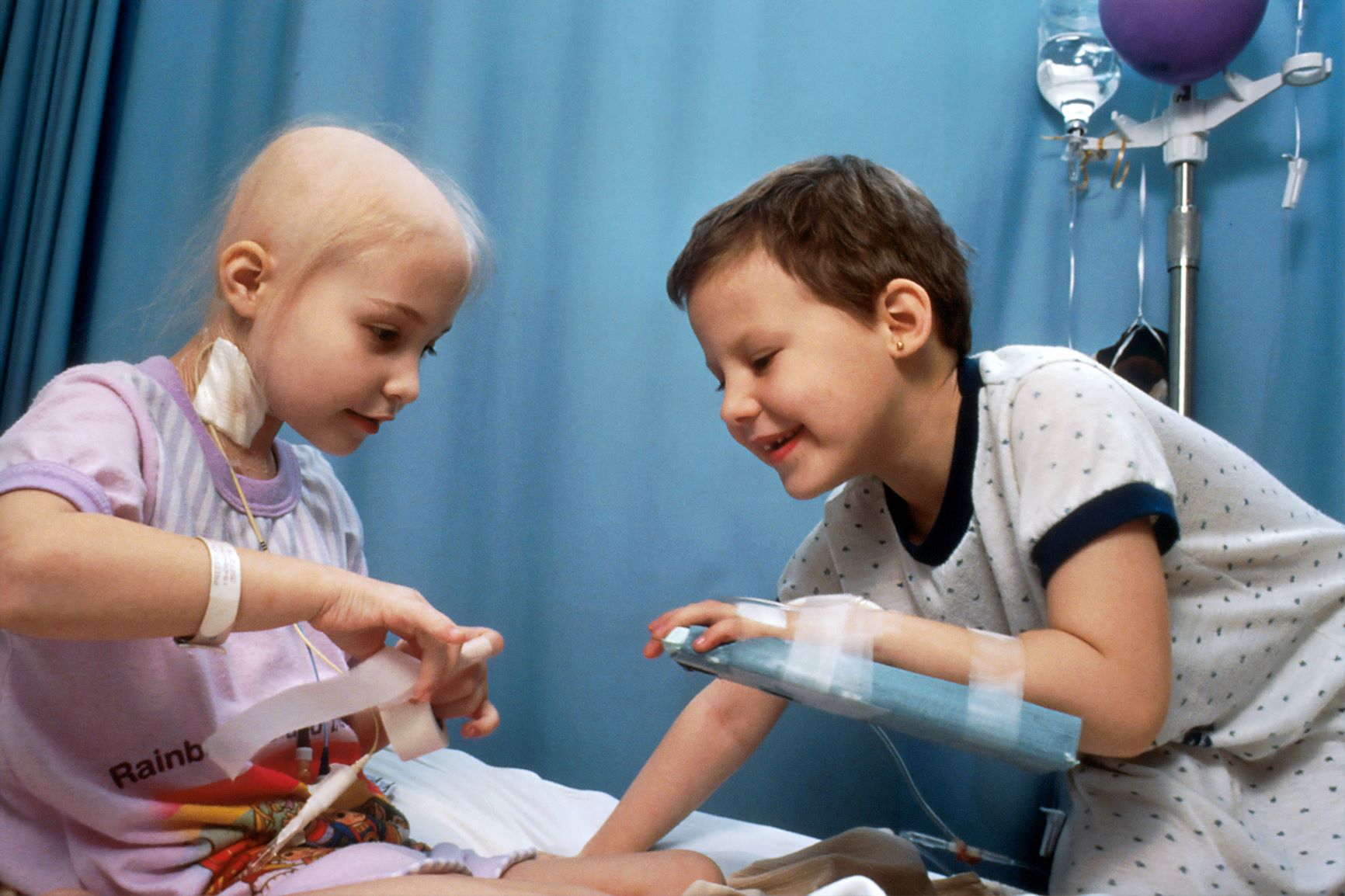
When children get cancer, their focus must switch from school, play and the task of growing up to medical procedures and the related stresses. Their reactions to this will depend on the child’s age, development level, and personality. Each child will react differently and cope differently with their diagnosis.
Share information with your child
It’s important to share information with children in an honest, age-appropriate way. Keeping everything secret or pretending nothing is wrong will only increase the child’s worry and fear, especially because they then think there is no reason to go through medical procedures and tests.
When information comes from doctors, decide if the family should all listen together, or if an adult should talk to the child afterwards.
Reassure the child that cancer isn’t a punishment
A child may think that cancer is something that you can catch or spread. They might also think that cancer happens as a punishment if you are naughty. Reassure young children that they did nothing to cause their cancer, and it isn’t contagious. Do not withdraw love and support for them.
Practice two-way communication
The doctors are experts on illness. But a parent is the expert when it comes to their child. When both sides share information, it can help to improve treatments and make things easier for the child. Some guidelines to note:
- take notes to help record and remember details
- practice respect and cooperation
- give the medical team accurate information about how the child’s health is, how they are feeling and behaving, and how they are responding to treatment.
- keep a list of questions to ask
- if there’s anything you don’t understand, ask
- let the doctor or medical team know if you have any doubts or concerns
- if there is confusion or conflict involving someone on the medical team, deal with that person directly before getting assistance from others.
Find support early on
Getting knowledge and support from the professionals around you can be invaluable as cancer treatment progresses. Speak to specialists, psychologists, or social workers, who have helped others like you through similar situations and will know what to suggest. The National Cancer Society of Malaysia provides psychosocial support for children with cancer and support groups for young survivors.
Keep things as normal and steady as possible
Your expectations as a parent or caregiver should not change for your child after a cancer diagnosis. If the child is in school, keep them connected to their school life, schoolwork and friends. Speak to their school about plans to continue their education.
Encourage children to share their feelings
As mentioned above, every child will deal with a cancer diagnosis differently. They may feel scared about treatments, sad that they cannot be with friends, or angry that they have to take medicine and go through unpleasant treatments. They may also suppress these feelings out of fear, or wanting to be ‘good’. Encourage children to share their feelings, and let them know these feelings are not wrong.
Talk to your doctors about managing side effects
Drugs, chemotherapy and radiotherapy can cause a wide range of side effects. Speak to your doctor or medical team, as they will be able to suggest ways to lessen the severity of these side effects, or alternative treatment methods.
Give your child choice
Help children retain some sense of control over the world by allowing them choices wherever appropriate. Some examples include
- what to wear
- what colour medicine to take first
- which side of the body to receive injections
Look out for signs of non-adjustment
After the first few weeks, most children can settle into their new routine with adequate support. Sometimes, it can be harder. If you see the following signs, speak to their doctor, a psychologist or social worker right away for more help:
- being unable to handle sadness
- unable to be comforted
- very quick to anger
- thoughts of violence or self-harm
- refusing to comply with treatment
- constant crying
- trouble sleeping
Find support for yourself
A proper support network will help you continue to support and advocate for your child. Speak to family, friends, support groups, NGOs, patient advocates, or counsellors. If you need help, do not be afraid to ask for it before a crisis point is reached.
Conclusion
A cancer diagnosis can be just as rough on children as it is on adults. But with the right support and the care of friends and family, they can go on to deal with their treatments and live their best lives.
References
American Cancer Society (2017) Finding Help and Support When Your Child Has Cancer [Accessed: 15 Jan 2020] Available at: https://www.cancer.org/treatment/children-and-cancer/when-your-child-has-cancer/during-treatment/help-and-support.html
American Cancer Society (2017) Helping Your Child Adjust to a Cancer Diagnosis [Accessed: 15 Jan 2020] Available at: https://www.cancer.org/treatment/children-and-cancer/when-your-child-has-cancer/after-diagnosis/helping-your-child.html
American Cancer Society (2017) Helping Your Child Manage School During Cancer Treatment [Accessed: 15 Jan 2020] Available at: https://www.cancer.org/treatment/children-and-cancer/when-your-child-has-cancer/during-treatment/keeping-up-with-schoolwork.html
American Cancer Society (2017) How to Talk to Your Child’s Cancer Care Team [Accessed: 15 Jan 2020] Available at: https://www.cancer.org/treatment/children-and-cancer/when-your-child-has-cancer/during-treatment/talking-to-team.html
National Cancer Institute (2018) Support for Families When a Child Has Cancer [Accessed: 15 Jan 2020] Available at: https://www.cancer.gov/about-cancer/coping/caregiver-support/parents
National Cancer Society Malaysia (2018) Psycho-Social Support For Children [Accessed: 15 Jan 2020] Available at: https://cancer.org.my/get-help/play-therapy-weekly-wonder/
National Cancer Society Malaysia (2018) Peer Support Groups [Accessed: 15 Jan 2020] Available at: https://cancer.org.my/get-help/support-groups/